If you’re a die-hard Chekhov fan, Nick Salamone’s 20th/21st-century “queer meditation” on the Russian playwright’s 124-year-old classic Three Sisters, a Playwrights’ Arena/Los Angeles LGBT Center World Premiere, will likely be more up your alley than it was mine.
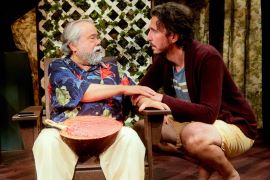 Unlike Aaron Posner, whose contemporary takes on The Seagull (Stupid Fucking Bird) and Uncle Vanya (Life Sucks) have the laughs coming fast and furious, Salamone sticks close to Three Sisters stylistically, which means if you find Chekhov talky and slow-going, Three doesn’t veer that far from the original.
Unlike Aaron Posner, whose contemporary takes on The Seagull (Stupid Fucking Bird) and Uncle Vanya (Life Sucks) have the laughs coming fast and furious, Salamone sticks close to Three Sisters stylistically, which means if you find Chekhov talky and slow-going, Three doesn’t veer that far from the original.
Not that there aren’t things to salute in Salamone’s adaptation, most significantly the diversity of its updated cast of characters, only a few of whom retain the names Chekhov gave them.
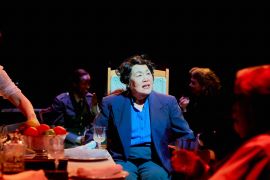 Eldest sibling Olga (Emily Kuroda) has become Masha and Irina’s Japanese-American half-sister, adopted by their father when he married their mother.
Eldest sibling Olga (Emily Kuroda) has become Masha and Irina’s Japanese-American half-sister, adopted by their father when he married their mother.
Army captain Amelia (Tracey A. Leigh) is female and black, family physician Kapiling (Alberto Isaac) is Filipino, Freddy (Eric B. Anthony) is African-American, and schoolteacher Kulilgan (Robert Almodovar) is Latino.
Not only that, but this diversity extends to sexual orientation and gender identity as well, with Masha (Rachel Sorsa), Irina (Hayden Bishop), Amelia, and Freddy all identifying as members of the LGBTQ+ community.
Indeed, only the three sisters’ brother Andrei (James Liebman), his wife Natasha (Rebecca Metz), and German Baron Nicky Tuzenbach (Clay Storseth) remain both cisgender and white.
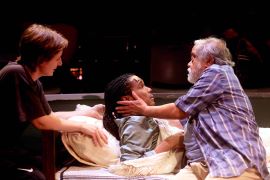 Salamone has also taken the bold step of situating each of Three’s four acts in a different decade, from the post-WWII 1940s of Act One, to the early-AIDS crisis 1980s of the second act, to the mid-1990s of the post-intermission Act Three (with the Oklahoma City bombing subbing for Chekhov’s town fire), to the post-lockdown early 2020s of Three’s final act.
Salamone has also taken the bold step of situating each of Three’s four acts in a different decade, from the post-WWII 1940s of Act One, to the early-AIDS crisis 1980s of the second act, to the mid-1990s of the post-intermission Act Three (with the Oklahoma City bombing subbing for Chekhov’s town fire), to the post-lockdown early 2020s of Three’s final act.
It’s an approach that both intrigues (and not just because the characters age a mere five years over the course of seven-and-a-half decades), and frustrates (since each act’s returning characters and their relationships with each other aren’t quite the same as those we’ve gotten to know in the previous act).
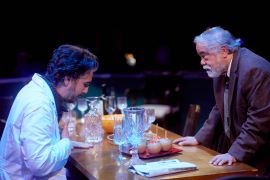 All of this might work better, for this reviewer at least, if Salamone’s characters spoke in a vernacular that rings authentic to contemporary ears, and not slightly stilted as Chekhov continues to come across in each “exciting new translation.” (For example, does anyone still say things like, “I can rouse myself to feel anger about how the world is and yet I am indifferent to my own family,” as Andrei does in Act Four’s 2022?)
All of this might work better, for this reviewer at least, if Salamone’s characters spoke in a vernacular that rings authentic to contemporary ears, and not slightly stilted as Chekhov continues to come across in each “exciting new translation.” (For example, does anyone still say things like, “I can rouse myself to feel anger about how the world is and yet I am indifferent to my own family,” as Andrei does in Act Four’s 2022?)
And it doesn’t help that, as anyone familiar with Chekhov’s oeuvre can tell you, nothing much “happens” on stage despite Three’s two-and-a-half-hour running time.
I can’t fault Jon Lawrence Rivera’s direction or the performances he has elicited on the L.A. Gay & Lesbian Center’s intimate Davidson/Valentini Theatre stage—I particularly enjoyed Metz’s viperous, holier-than-thou Natasha, and Sorsa gives Masha the most gut-wrenching of eleventh-hour breakdowns—though the age gap between eldest and youngest siblings strains credibility.
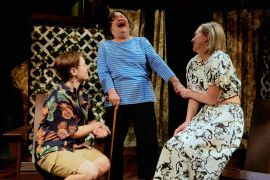 Scenic designer Lily Bartenstein makes inventive use of furniture, props, and projections throughout the production. (Hiding a pair of garden trellises under the previous act’s beds is a particularly nifty touch.)
Scenic designer Lily Bartenstein makes inventive use of furniture, props, and projections throughout the production. (Hiding a pair of garden trellises under the previous act’s beds is a particularly nifty touch.)
Matt Richter’s lighting (including a candlelit Act II), Jesse Mandapat’s sound design, and (especially) Mylette Nora’s four different decades of costumes are all topnotch.
Desiree Fernandez is dramaturg. Letitia Chang is stage manager. Zach Davidson is lead producer. Casting is by Raul Staggs.
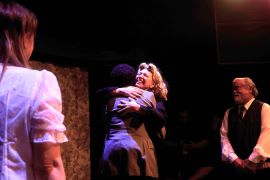 Given my decidedly mixed feelings about Chekhov to begin with, my reaction to Three may differ from yours if you look forward eagerly to each new Cherry Orchard, Seagull, or Uncle Vanya.
Given my decidedly mixed feelings about Chekhov to begin with, my reaction to Three may differ from yours if you look forward eagerly to each new Cherry Orchard, Seagull, or Uncle Vanya.
If, on the other hand, you’d happily opt for Christopher Durang’s Vanya and Sonya and Masha and Spike over another Chekhov revival, your feelings towards Nick Salamone’s Three may be less enthusiastic.
The Davidson/Valentini Theatre, L.A. Gay & Lesbian Center, The Village at Ed Gould Plaza, 1125 N. McCadden Place, Los Angeles.
www.playwrightsarena.org
www.lalgbtcenter.org/events
–Steven Stanley
February 18, 2024
Photos: Zev Rose Woolley
Tags: Anton Chekhov, Los Angeles LGBT Center, Los Angeles Theater Review, Nick Salamone, Playwrights' Arena


 Since 2007, Steven Stanley's StageSceneLA.com has spotlighted the best in Southern California theater via reviews, interviews, and its annual StageSceneLA Scenies.
Since 2007, Steven Stanley's StageSceneLA.com has spotlighted the best in Southern California theater via reviews, interviews, and its annual StageSceneLA Scenies.







 COPYRIGHT 2025 STEVEN STANLEY :: DESIGN BY
COPYRIGHT 2025 STEVEN STANLEY :: DESIGN BY